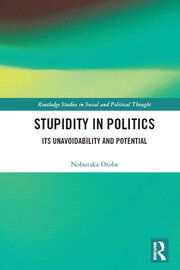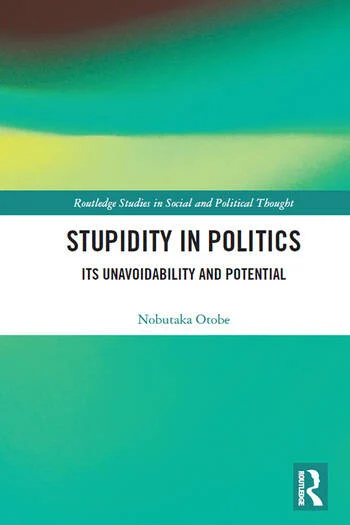Nobutaka Otobe, Stupidity in Politics: Its Unavoidability and Potential


Nobutaka Otobe, Stupidity in Politics: Its Unavoidability and Potential (Routledge, 2021)
In what might be reasonably surmised to be a response to the recent Congressional and Presidential elections in the U.S., I have been hunting around for a book to review that is focussed on the interrelationships between democracy and intelligence. The first ones that came to mind were a couple of American bestsellers published in 2007: Charlie Pierce’s Idiot America and Al Gore’s Assault on Reason. Reading a bit of each, however, convinced me that neither was quite what I was looking for. The Pierce is fun to read, but its extreme snarkiness makes it resemble a number of post-Seinfeld sitcoms in containing at least one joke every three lines. In other words, there was a bit too much of the sports-page wise guy in that book even for me. For its part, the Gore work suffers from its expectation that the internet will make things better. In addition, there is a lot of partisan (if reasonable) foreign policy discussion in it, particularly involving Iraq. While I think nobody ought to blame Gore for any lingering resentment he might have had over the election that he seems to many people to have actually won, or his quite reasonable assessment of the Bush Administration, that sort of political punditry lies a bit outside my interests.
My continuing research eventually brought me to Otobe’s scholarly investigation of stupidity, where instead of scenes of Christian amusement parks containing displays of dinosaurs wearing saddles, or of criticisms involving the alleged “weapons of mass destruction” threatening Kuwait, we are treated with a discussion of stupidity that is associated with such heavyweight mysteries as Kant’s antinomies, Descartes’ Cogito, the unity of consciousness, and Heidegger’s conception of Being.
But are all three books actually talking about the same thing when they discuss stupidity? Unfortunately, this is never made entirely clear. This is partly because (speaking of Kant), it seems to remain true that concepts without intuitive content are empty. That is, if Pierce and Gore never quite get to an analysis—or as the more continental-philosophy-influenced Otobe likes to put it—a problematization, of stupidity, causal or otherwise, Otobe resists giving a single example of a stupid thought, remark or writing anywhere in his book.* No doubt this is partly because he takes stupidity to be inextricably bound up with every thought. For, following his hero Deleuze, Otobe believes that “we cannot attain an a priori, universal standard to distinguish thinking from stupidity.” Nevertheless, in a work explicitly concerned with that property, it would have been nice to have been treated to a few paradigm cases of what Otobe takes to be stupid thinking or behavior. After all, it seems that such examples are required for readers to assess the aptness of his exercise in “problematics.”
Further complicating this matter is the fact that Otobe explicitly distinguishes stupidity from idiocy, taking the latter to be more of a specifically individualistic activity. In his view, idiocy is a matter of thinking entirely outside societal expectations, while stupidity is, as Otobe believes Flaubert suggests in Bouvard and Pecuchet, a matter of regurgitating clichés. That distinction might have been clarifying if Pierce had not himself distinguished the idiocy he is interested in from the wacky theories of those he designated as “cranks”: fellows like Samuel Butler, who put forth and stubbornly maintain theories that are demonstrably wrong. According to Pierce, typical contemporary idiocy, unlike the crankdom he almost admires, resembles what Otobe calls stupidity in requiring neither study nor other industry of any kind. Stupidity is dead easy, while to be a Piercean crank or Otobean idiot, one has to concoct one’s own contrarian theory.
Because of these conceptual interweavings, it really would have been nice for Otobe to provide a handful of examples of stupid thinking rather than spending so many of his pages “problematizing” the concept. Unfortunately, the only hints we are given up front involve (i) a remark in Der Spiegel calling “the US withdrawal from the Paris Agreement on climate change as ‘Donald Trump’s Triumph of Stupidity’”; and (ii) a number of repetitions of the claim that stupidity (unlike both idiocy and the “thoughtlessness” with which Hannah Arend charged Eichmann) involves belief in and/or regurgitation of banal clichés and “stock phrases.” Unfortunately, whether Otobe agrees with Der Spiegel regarding Trump’s approach to the Paris Agreement is never disclosed.
As indicated, Otobe’s background is clearly in Continental philosophy and post-structuralism, which to an old Anglophile like me, makes the language of his book seem regularly labyrinthine and occasionally indecipherable. (I mean, what possesses anyone to use “theorization”when “theory” would work too? When did “problematic” become a noun?--Has “problem” ceased to perform that job…as well as the task now here sometimes taken over by “problematicity”? Such awkward choices can be found on nearly every page.) In any case, while I am not equipped to assess Deleuze or Heidegger scholarship on individuality or the nature of Being, and will not have anything useful to say about Kant, I do think that if one can manage to get past the exotic (not to say ultramundane) language here, one may find material in this book that will be of value not only to democratic theorists but to political philosophers generally.
To my way of thinking, ferreting out the connections between stupidity and democracy is crucial because if stupidity (whatever it may be, precisely) is taken to be a vote disqualifier or diluter, what is likely to remain will be some sort of epistocracy, a system that ought not to qualify as authentic democracy at all. So, the question of what to think about those who believe that Christian human beings domesticated dinosaurs before loading them onto Noah’s Ark (or that Ivermectin cures COVID-19 and vaccines cause autism) is important.
Rousseau insisted that the “general will” was not just a function of aggregating citizen desires, but should be understood to be a unification of what those citizens take to be “the common good.” It seems fairly clear that those with extremely limited knowledge of the real world ought not to have their views of what constitutes the common good taken terribly seriously. Though it may seem harsh or elitist, that conclusion simply follows from the fact that assessments of a group’s prudential value involve probability estimates and other difficult matters of social science. As the same cannot be said of the simple aggregation of “what the people want” (rather than what actually would be good for amy group), democratic theorists must answer the question of whether what the people want should also be taken with a grain of salt, and, if so, what/whose judgments ought to replace the generally uninformed wishes of electorates. One thing one might infer from the copious examples of idiotic beliefs amassed in Pierce’s earlier book: we ought not to agree with Hannah Arendt that “truth, whether it be philosophical, factual or scientific, comes with compulsion and needs no agreement for it to appear to be true.” While Arendt insists that truth “has a despotic character,” it seems rather that, while one’s cuckoo flat-earther peers may be despotic, in our AI-saturated world, truth is anything but universally compelling.
Otobe’s discussion of Rousseau, whose views are certainly paradoxical (not to say self-contradictory or at least extremely confused) is quite interesting. He notes that the 18th Century philosopher argued that the general will “left no room for individual opinions” and thus “frees people from stupidity.” On Rousseau’s view, it was only the social contract that allowed for “the happy moment [when] out of a stupid and bounded animal [came] an intelligent human being.”
For what it may be worth, I take precisely the opposite view on this matter–as, in some of his writings, Rousseau seems to have done himself. It’s my view that assessing what is most prudentially valuable to a group is a difficult matter that laypeople are almost certain to get wrong, but that each person is an absolute expert with respect to what they want. The problem for democracy is that group prudential value judgements are generally inferred from the aggregation of individual wants. So, I take it, it is essential to place impassable obstacles to inferences of that sort (e.g., from “I want Trump” to “Tariffs would be a good thing for my country” in any acceptable democratic scheme. That means not only that “epistemic democracy” is confused, but that good democracies should reflect these values: “Referendums, Yes; Initiative Petitions, No. Recall, Yes; Representatives as Delegates, No. Judicial Independence, Yes; But Reversal of general tenets in judicial decisions, Also Yes. And finally, Constitutional Amendability, Yes–except with respect to those principles that are absolutely required for authentic democracy.”
Again, Rousseau takes a nearly polar opposite position (at least sometimes). As Otobe points out, in Emile, Rousseau wrote, “Conscience, conscience! Divine instinct, immortal and celestial voice assured guide of a being that is ignorant and limited but…[an] infallible judge of good and evil.” Thus, for him, while we are often wrong in what we want for ourselves, we will always get the moral and prudential group judgements right. But it’s also the case, Rousseau thinks, that without others, we are on the level of beasts, while with them, we become gods. We are, he thinks, inoculated from any possible stupidity when we think about the common good. That means that a majority connecting smallpox vaccinations with autism must be right. Again, consistency was not among Rousseau’s many virtues. Otobe points out that Rousseau also sometimes saw the need for a genius lawgiver, “a godlike figure whose gift surpasses that of ordinary people….in order to rally by divine authority those whom human prudence could not move.”
Otobe finds confirmation of his thesis that it is copycats who most clearly display stupidity both in Mill’s remark in his Autobiography that good music was destined to end with Mozart and Weber (there being so few notes, possible note relationships, and pleasing sounds), and in his remark in On Liberty that “Stupidity is much the same all the world over. A stupid person’s notions and feelings may confidently be inferred from those which prevail in the circle by which the person is surrounded.” Mill took wisdom to require originality, but stupidity to usually be a matter of repeating what one has heard. Thus, “public opinion” is dangerous and the crowd is likely to be tyrannical. It is therefore much safer to depend on solitary thinkers. For Tocqueville too, the “sway of public opinions leads to democratic despotism.” The mimicking of the stirring words of 1789 at the time of the 1848 revolutions was as much cosplay as political thinking. As Marx famously put it in The Eighteenth Brumaire, “revolutions are carried out the first time as high tragedy, and the second time as low farce.”
However, Tocqueville resembles Rousseau in being prone to inconsistency in his writings: while he finds groupthink dangerous, he also warns against the selfishness which seems to him to be the inexorable result of individualism. He apparently sees a solution in the “reciprocal communication of opinions in and between associations,” but as Habermas points out, Tocqueville seems to have ignored the fact that associations can also reflect their portion of received public opinion and “can harbor mediocrity and clichés rather than renew ideas.”
There is no space here to discuss Otobe’s thoughtful and informative chapter on Kant, Arendt, and Habermas regarding the nature of factual, aesthetic, moral and political judgments, but I will say here (and elsewhere in more detail, I hope) that I generally take Arendt’s side in those disputes. I also pass over the interesting chapter focused on the mid- 20th Century writings of Japanese literary critic Hideo Kobayashi.
The concluding chapter, which is on the alleged potential that stupidity makes available to democracy, allows Otobe to make some trenchant criticisms of what can be accomplished by public or private deliberation. While Otobe shares several concerns that other critics of deliberative democracy have offered, he sees “the problem not so much in the feasibility of proposals as in their evasion of the problem of stupidity. Even if we attain reasonable agreement on our public concerns, and even if our resulting opinions are procedurally correct—that is, undistorted and unbiased—these opinions may remain stupid.” In Otobe’s view, advocates of deliberative democracy miss the key problem when they focus on “uneven distribution of influence, power, authority, knowledge, and access to public discussion. While those inequalities are detrimental to our capability of deliberation…the reasoning of equal individuals can well result in stupidity….An ideal public arena does not secure our reflection against [it].”
Rather than attempt to “safeguard” or “purify” liberal democracy, Otobe, who denies there can be a “solution” to any alleged problem of thinking that is itself intrinsic to the process of thought, instead suggests something that he calls “dramatization”: an activity said to “reveal the modes through and extents to which Ideas provoke and limit certain concepts that govern our life.” Unfortunately, the manners in which increased dramatization is supposed to be injected into the various schemes of governance now operative around the world are neither specified nor even hinted at and, sadly, remain quite mysterious to this reader. Nevertheless, Otobe has given us a thoughtful and original book, and perhaps other readers will be more successful in understanding what the author is suggesting ought to be done with its conclusions.
_______* To be fair , Otobe does give one example of something that, in an 1949 letter to Francois Parain, Flaubert indicated was a particularly stupid thing to do: On an ancient Pompey column in Alexandria, a gentleman from Sunderland, UK wrote his name (“Thompson”) in six-foot high letters, something that could be seen for miles. Flaubert wrote, “Stupidity is unshakable; nobody can attack it without succumbing to it.” But (The Adventures of Tintin notwithstanding) how “Thompson” can be an example of a cliche or stock phrase is not obvious, and that is something claimed by Otobe to be an essential sign stupidity.

About the Author
Walter Horn is a philosopher of politics and epistemology.
His 3:16 interview is here.
Other Hornbook of Democracy Book Reviews
His blog is here